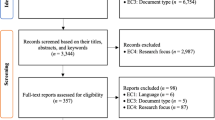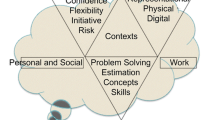Abstract
This article reports on a study that investigated prospective elementary teachers' knowledge and convictions regarding content, pedagogy, and pupil needs as well as on their rationales for the teaching of mathematics. Data collected through journals is qualitatively analysed and interpreted to understand common views on ‘ideal’ mathematics classes. The findings are used as a basis for a broader sociological discussion of the school's role in a changing environment. Participants in this study tend to value mathematics classes mainly in terms of the degree of pupil enjoyment. Consequently, they comprehend the teacher's role as beyond instruction: the teacher as an entertainer. This is discussed by confronting the two conceptions of school as a locus for serious learning, and of school as a ‘playhouse’.
Similar content being viewed by others
REFERENCES
Abelson, R.: 1979, 'Differences between belief systems and knowledge systems', Cognitive Science, 3, 355–366.
Bishop, A.J. et al. (eds.): 1996, International handbook of mathematics education, Kluwer Academic Publishers, Dordrecht.
Blumer, H.: 1954, 'What is wrong with social theory?', American Sociological Review, 19 (1), 3–10.
Bohnsack, R.: 1991, Rekonstruktive Sozialforschung [Reconstructive research in social science], Opladen, Leske + Budrich.
Borasi, R. and Rose, B.J.: 1989, 'Journal writing and mathematics instruction', Educational Studies in Mathematics, 20, 347–365.
Bromme, R.: 1994, 'Beyond subject matter: A psychological topology of teacher's professional knowledge', in R. Biehler et al. (eds.) Didactics of mathematics as a scientific discipline, Kluwer Academic Publishers, Dordrecht, pp. 73–88.
Buerk, D.: 1993, 'An experience with some able women who avoid mathematics', in S. Brown and M. Walter (eds.) Problem posing: Reflections and applications, Lawrence Erlbaum Associates, Hillsdale, pp. 70–82.
Buxton, L.: 1991, Math panic, Heinemann Educational Books, Portsmouth.
Carpenter, T.P. and Fennema, E.: 1989, 'Building on the knowledge of students and teachers', Proceedings of PME 13, Volume 1, Paris, 34–45.
Chapman, O.: 1997, 'Metaphors in the teaching of mathematical problem solving', Educational Studies in Mathematics, 32, 201–228.
Cooney, T.J.: 1988, 'The issue of reform: What have we learned from yester-year?', Mathematics Teacher, May 1988, 352–363.
Ebert, W.: 1973, 'Sesam Straβe: auf unsere Kinder nicht übertragbar', Bayerische Schule, 26 (10), 236–243.
Ernest, P.: 1989, 'The impact of beliefs on the teaching of mathematics', in C. Keitel et al. (eds.) Mathematics, Education, and Society, UNESCO Document Series No. 35, UNESCO, Paris, pp. 99–101.
Fischer, R.: 1993, 'Mathematics as a means and as a system', in S. Restivo, J.P. Van Bendegem and R. Fischer (eds.), Math worlds: Philosophical and social studies of mathematics and mathematics education, SUNY Press, New York, pp. 113–133.
Gellert, U.: 1998, Von Lernerfahrungen zu Unterrichtskonzeptionen —eine soziokulturelle Analyse von Vorstellungen angehender Lehrerinnen und Lehrer zu Mathematik und Mathematikunterricht [From learning experiences to conceptions for instruction], Verlag für Wissenschaft und Forschung, Berlin.
Green, T.F.: 1971, The activities of teaching, McGraw-Hill, New York.
Grouws, D.H. (ed.): 1992, Handbook of research on mathematics teaching and learning, Macmillan, New York.
Hersh, R.: 1979, 'Some proposals for reviving the philosophy of mathematics', Advances in Mathematics, 31, 31–50.
Heymann, H.W.: 1996, 'Thesen zur Mathematiklehrerbildung aus der Perspektive eines Allgemeinbildungskonzeptes', in R. Biehler, R.W. Heymann and B. Winkelmann (eds.), Mathematik allgemeinbildend unterrichten [Teaching mathematics as general education], IDM 21, Aulis, Cologne, pp. 16–28.
Hopmann, S. and Künzli, R.: 1997, 'Close our schools! Against current trends in policy making, educational theory and curriculum studies', Journal of Curriculum Studies, 29 (3), 259–266.
Keitel, C.: 1998, 'The education of teachers of mathematics in Germany', in H.-J. Vollrath (ed.), Mathematics education in Germany, Eggenstein-Leopoldshofen, Fachinformationszentrum Karlsruhe, pp. 16–25.
Keitel, C., Kotzmann, E. and Skovsmose, O.: 1993, 'Beyond the tunnel vision: Analysing the relationship between mathematics, society and technology', in C. Keitel and K. Ruthven (eds.), Learning from computers: Mathematics education and technology, Springer-Verlag, Berlin, pp. 243–279.
Kelle, U.: 1994, Empirisch begründete Theoriebildung. Zur Logik und Methodologie interpretativer Sozialforschung [Empirical grounded theory: On the logic and methodoloy of interpretive research in social science], Deutscher Studien Verlag, Weinheim.
Lappan, G. and Theule-Lubienski, S.: 1994, 'Training teachers or educating professionals? What are the issues and how are they being resolved?', in D.F. Robitaille, D.H. Wheeler and C. Kieran (eds.), Selected lectures from the 7th International Congress on Mathematical Education, Les Presses de l'Université Laval, Sainte-Foy, pp. 249–262.
Marks, R.: 1990, 'Pedagogical content knowledge: From a mathematical case to a modified conception', Journal of Teacher Education, 41 (3), 3–11.
Mayring, P.: 1988, Die qualitative Wende. Arbeiten zur qualitativen Forschung [The qualitative turn. Works in qualitative research], Augsburg, Augsburger Berichte zur Entwicklungspsychologie und Pädagogischen Psychologie 32.
Mayring, P.: 1995, 'Qualitative Inhaltsanalyse', in U. Flick et al. (eds.), Handbuch qualitiativer Sozialforschung (2. Auflage) [Handbook on qualitative research in social science], Beltz, Weinheim, pp. 209–218.
McLeod, D.B.: 1992, 'Teachers' beliefs and conceptions: A synthesis of the research', in D.A. Grouws (ed.), Handbook of research on mathematics teaching and learning, Macmillan, New York, pp. 575–596.
Morel, J. et al. (eds.): 1995, Soziologische Theorie [Sociological theory], 4th edition, Munich, Oldenbourg.
Morris, R. (ed.): 1984, Studies in mathematics education. The mathematical education of primary-school teachers, Vol. 3, Unesco, Paris.
Nespor, J.: 1987, 'The role of beliefs in the practice of teaching', Journal of Curriculum Studies, 19 (4), 317–328.
Peterson, P.L., Fennema, E., Carpenter, T.P. and Loef, M.: 1989, 'Teachers' pedagogical content beliefs in mathematics', Cognition and Instruction, 6, 1–40.
Porter, A.C. and Brophy, J.: 1988, 'Synthesis of research on good teaching: Insights from the work of the Institute for Research on Teaching', Educational Leadership, 45, 74–85.
Robitaille, D.F.: 1994, 'Assessing educational outcomes: The role of international studies. TIMSS: The Third International Mathematics and Science Study', in K.P. Müller (ed.), Beiträge zum Mathematikunterricht [Contributions to mathematics education], Franzbecker, Hildesheim, pp. 35–42.
Schoenfeld, A.H.: 1985, Mathematical problem solving, Academic Press, Orlando.
Shulman, L.S.: 1986, 'Those who understand: knowledge growth in teaching', Educational Researcher, 15 (2), 4–14.
Skovsmose, O.: 1994, Towards a philosophy of Critical Mathematics Education, Kluwer Academic Publishers, Dordrecht.
Steffe, L.: 1990, 'On the knowledge of mathematics teachers', in R.B. Davis, C.A. Maher and N. Noddings (eds.), Constructivist views on the teaching and learning of mathematics, NCTM, Reston, pp. 167–184.
Taylor, J.A.: 1995, 'Attitude to mathematics of adults returning to tertiary study in the distance mode', in R.P. Hunting et al. (eds.), Proceedings of the ICMI regional conference: Regional Collaboration in Mathematics Education, Melbourne, 19.-23.4.1995, pp. 685–694.
Thom, R.: 1973, 'Modern mathematics: Does it exist?', in A.G. Howson (ed.), Developments in mathematical education, Cambridge University Press, Cambridge, pp. 194–209.
Thompson, A.G.: 1984, 'The relationship of teachers' conceptions of mathematics and mathematics teaching to instructional practice', Educational Studies in Mathematics, 15, 105–127.
Thompson, A.G.: 1992, 'Teachers' beliefs and conceptions: A synthesis of the research', in D.A. Grouws (ed.), Handbook of research on mathematics teaching and learning, Macmillan, New York, pp. 127–146.
Vollrath, H.-J. (ed.): 1998, Mathematics education in Germany, Fachinformationszentrum Karlsruhe, Eggenstein-Leopoldshofen.
Von Hentig, H.: 1971, Cuernavaca oder Alternativen zur Schule? [Cuernavaca, or alternatives for schooling?], Klett, Stuttgart.
Author information
Authors and Affiliations
Rights and permissions
About this article
Cite this article
Gellert, U. Prospective elementary teachers' comprehension of mathematics instruction. Educational Studies in Mathematics 37, 23–43 (1998). https://doi.org/10.1023/A:1026492400537
Issue Date:
DOI: https://doi.org/10.1023/A:1026492400537




